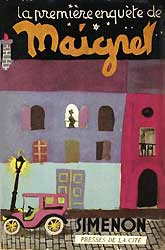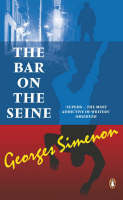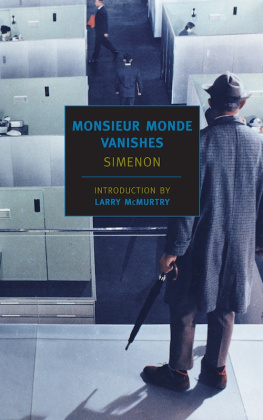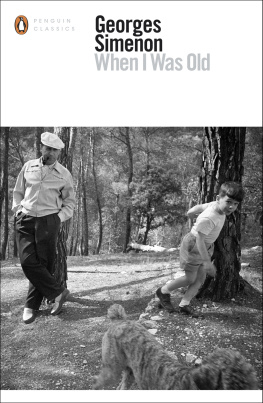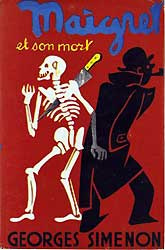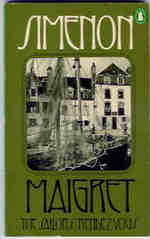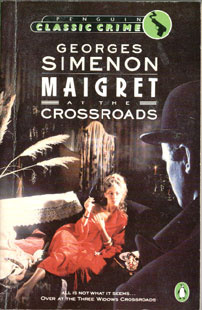Georges Simenon - Maigrets First Case
Here you can read online Georges Simenon - Maigrets First Case full text of the book (entire story) in english for free. Download pdf and epub, get meaning, cover and reviews about this ebook. year: 1963, publisher: Penguin, genre: Detective and thriller. Description of the work, (preface) as well as reviews are available. Best literature library LitArk.com created for fans of good reading and offers a wide selection of genres:
Romance novel
Science fiction
Adventure
Detective
Science
History
Home and family
Prose
Art
Politics
Computer
Non-fiction
Religion
Business
Children
Humor
Choose a favorite category and find really read worthwhile books. Enjoy immersion in the world of imagination, feel the emotions of the characters or learn something new for yourself, make an fascinating discovery.
- Book:Maigrets First Case
- Author:
- Publisher:Penguin
- Genre:
- Year:1963
- Rating:4 / 5
- Favourites:Add to favourites
- Your mark:
- 80
- 1
- 2
- 3
- 4
- 5
Maigrets First Case: summary, description and annotation
We offer to read an annotation, description, summary or preface (depends on what the author of the book "Maigrets First Case" wrote himself). If you haven't found the necessary information about the book — write in the comments, we will try to find it.
Maigrets First Case — read online for free the complete book (whole text) full work
Below is the text of the book, divided by pages. System saving the place of the last page read, allows you to conveniently read the book "Maigrets First Case" online for free, without having to search again every time where you left off. Put a bookmark, and you can go to the page where you finished reading at any time.
Font size:
Interval:
Bookmark:
Maigrets First Case
La premire enqute de Maigret, 1913
the 57th episode in the Maigret Saga
1949
Georges Simenon
Translated from the French by Robert Brain
A 3S digital back-up edition 1.0
Contents
||
MAIGRET CINQ
Maigret And The Young Girl
Maigrets Little Joke
Maigret And The Old Lady
Maigrets First Case
Maigret Takes A Room
A Helen and Kurt Wolff Book
Harcourt, Brace & World, Inc.
NEW YORK
Copyright 1951, 1955, 1957, 1958 by Georges Simenon
Copyright 1960 by Hamish Hamilton Ltd.
All rights reserved. No part of this book may be reproduced in any form or by any mechanical means, including duplicating machine and tape recorder, without permission in writing from the publisher.
First American edition 1965
Library of Congress Catalog Card Number: 65-16954
Printed in the United States of America
All characters in this book are fictitious and are not intended to represent any actual persons living or dead.
Originally published in Great Britain under the title The Second Maigret Omnibus .
Maigret and the Young Girl (Maigret et la jeune morte) , originally published in the United States as Inspector Maigret and the Dead Girl , was translated from the French by Daphne Woodward; Maigrets Little Joke (Maigret samuse) , originally published in the United States as None of Maigrets Business , by Richard Brain; Maigret and the Old Lady (Maigret et la vieille dame), Maigrets First Case (La premire enqute de Maigret) , and Maigret Takes a Room (Maigret en meubl) , originally published in the United States as Maigret Rents a Room , by Robert Brain.
MAIGRETS FIRST CASE
Chapter I
A black railing divided the room in two. In the part reserved for the public there was only the one backless bench, also painted black, against a whitewashed wall covered with official notices. On the other side were some desks, with inkstands, pigeon-holes filled with bulky files, which were black too, so that everything was black and white. The most obvious thing, standing on a sheet of metal, was a cast-iron stove, the sort only to be seen nowadays in small town railway stations, with a pipe which first climbed up towards the ceiling, then bent round, going right across the room before disappearing into the wall.
The baby-faced constable, who had unbuttoned his uniform and was trying to go to sleep, was Lecoeur.
The clock-face, set in a round black frame, showed twenty-five past one. Every so often, the single gas jet would sputter. Every so often, too, the stove, for no apparent reason, would begin to snore.
Outside, the peace of the night was occasionally disturbed by the noise of rockets, becoming less and less frequent now; or by the singing of a drunkard, or a cab passing down the sloping street.
At the left-hand desk, the secretary of the Saint-Georges Police Station was moving his lips like a schoolboy, as he bent over a booklet which had just come out: Course on Official Reports (Oral Description) for the use of Inspectors and Police Officers .
In violet ink, on the flyleaf, was written, in a copper-plate hand: J. Maigret.
Three times already during the course of the night, the young station secretary had got up to go and poke the stove, and he was to feel nostalgic about that stove for the rest of his life ; he would later find the same one, or one very similar, at the Quai des Orfvres, and in due course when central heating was installed at Police Headquarters, Chief-Divisional-Inspector Maigret, chief of the special squad, would manage to have it kept on in his office.
It was the 15th of April, 1913. Paris Police Headquarters was then still known as the Sret. That morning a foreign monarch had arrived in great pomp at Longchamps Station, and the President of the Republic had been there to welcome him. Official landaus, flanked by the National Guard in full dress uniform, had paraded down the Avenue du Bois and along the Champs-Elyses, between two lines of flags and people.
There had been a gala performance at the Opra, fireworks, processions, and the sound of public revelry had only now begun to quieten down.
The police were exhausted. In spite of the precautions taken, the preventive arrests, the arrangements made with certain allegedly dangerous individuals, there was the risk of an anarchists bomb right up to the last moment.
Maigret and Police-Constable Lecoeur were alone in the Saint-Georges Police Station, in the quiet Rue La Rochefoucauld.
Both of them looked up when they heard hurried steps on the pavement outside. The door opened. A young man, out of breath, stared around him, dazzled by the gaslight.
The superintendent? he asked, panting.
Im his secretary, Maigret said, not moving from his chair.
He didnt then realize that this was the beginning of his first case.
The man was fair-haired, weedy, with blue eyes and a pink complexion. He was wearing an oilskin mackintosh over a black suit and held a bowler hat in one hand, while with the other he kept dabbing at a bruised and swollen nose.
Has some hooligan attacked you?
No. I was trying to go to the rescue of a woman who had called for help.
In the street?
In a house in the Rue Chaptal. I think youd better go there straight away. They threw me out.
Who did?
A sort of butler or porter.
Dont you think youd better begin at the beginning? What were you doing in the Rue Chaptal?
I was coming back from work. My name is Justin Miriard. Im second flautist in the Concerts Lamoureux, but in the evening I play at the Brasserie Clichy, in the Boulevard de Clichy. I live in the Rue dEnghien just opposite the Petit Parisien. I was going home by way of the Rue Ballu, then the Rue Chaptal, the same as every night.
Very much the conscientious clerk, Maigret was taking notes.
About half-way down the street, which is almost always deserted, I noticed a motor-car parked, a De Dion Bouton, with its engine still running. In the driving seat there was a man in a grey goatskin jacket, his face almost entirely hidden by enormous goggles. When I was just about level with him, somebody opened a window on the second floor.
Did you notice the number of the house?
17A. Its a private house with a gateway. There were no lights in any of the other windows. Only the second window from the left, the one that had been opened, had a light on. I looked up and saw the figure of a woman who was trying to lean out, shouting Help!
What did you do?
Ill tell you in a minute. Somebody who was in the room must have pulled her back. At the same moment a shot rang out. I turned towards the motor I had just passed and it suddenly drove off.
Are you sure it wasnt the engine back-firing you heard?
Im positive. Then I went to the door and rang the bell.
You were all by yourself?
Yes.
Armed?
No.
What did you intend doing?
Well
The flautist was so baffled by the question he could think of nothing to say. Were it not for his fair moustache and his few wisps of beard, he would not have looked more than sixteen.
The neighbours didnt hear anything?
Apparently not.
Was the door opened?
Not straight away. I rang at least three times. Then I kicked at the door. At last I heard footsteps, a chain being lifted, a bolt drawn. There was no light in the porch, but theres a gas-lamp just in front of the house.
One forty-seven. Now and then the flautist glanced anxiously at the clock.
A big fellow, all in black like a butler, asked me what I wanted.
Was he fully dressed?
Next pageFont size:
Interval:
Bookmark:
Similar books «Maigrets First Case»
Look at similar books to Maigrets First Case. We have selected literature similar in name and meaning in the hope of providing readers with more options to find new, interesting, not yet read works.
Discussion, reviews of the book Maigrets First Case and just readers' own opinions. Leave your comments, write what you think about the work, its meaning or the main characters. Specify what exactly you liked and what you didn't like, and why you think so.

